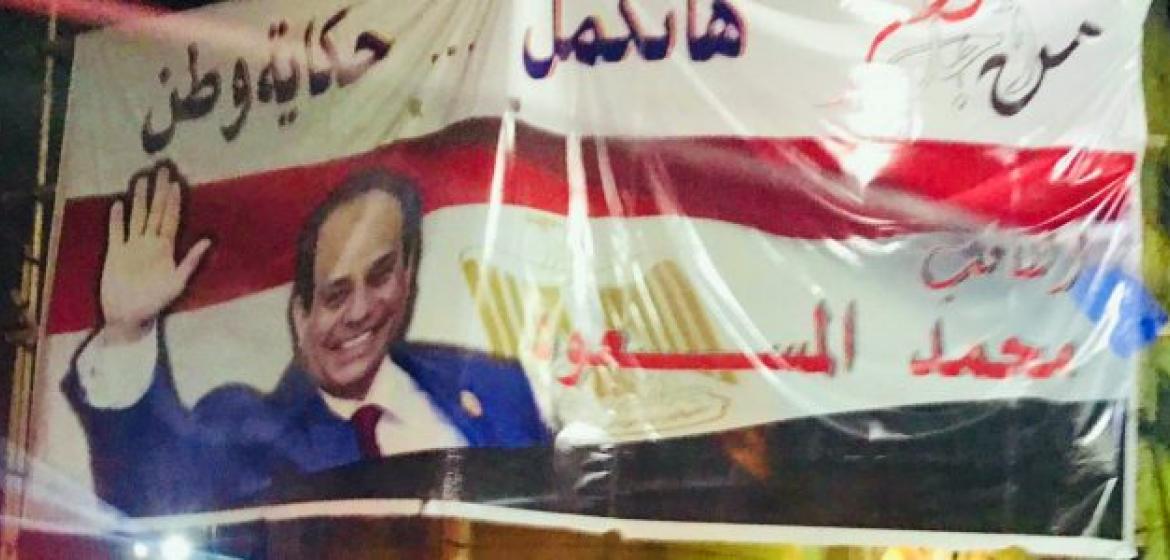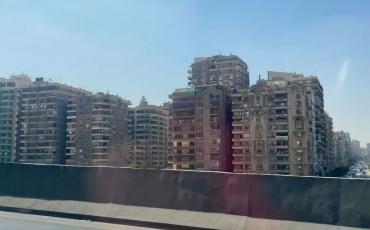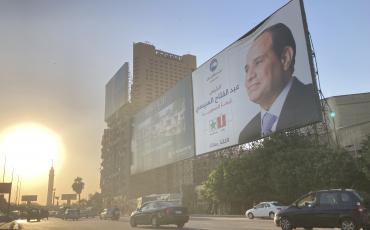How Egypt's authorities tried everything to raise the turnout at the presidential elections.
Lesen Sie hier eine deutsche Version dieses Artikels.
With Al-Sisi left to ‘compete’ against one of his supporters, Moussa Mostafa Moussa, the real challenge for the state was pushing electors to participate in an already decided race. This was manifested through the official elections campaign sponsored by the Egyptian National Electoral Commission (NEC) that aired on almost every Egyptian television or radio station. With the slogan: “Your vote is not just a vote, it is a message to the world” and a clear statement that “this time it does not matter who will win”, the message was clear. This election was not about the president getting reelected. It was more of a challenge to the opposition who called for election boycott. Also, a high turnout should send the message that Al-Sisi enjoys massive popularity amongst Egyptians and will stabilize his regime.
The carrot and the stick
The turnout challenge between the state and the opposition was demonstrated in various Egyptian media platforms. MadaMasr, an independent opposition newspaper, reported that “Several businessmen and companies provided buses covered with Al-Sisi campaign banners to transport staff to polling stations”. A similar incident was reported, in a more positive light, by the pro-state newspaper, El-Watan, stating that “some private schools dedicated their buses to carry the citizens to their polling stations.” Hassan Rateb, a businessman, proudly aired a video on his privately owned Mehwar TV-channel, showing him providing busses to transfer the employees of his companies to their voting stations.
Rateb also announced that the chairmen of several NGOs decided to donate 4 Million EGP (~200,000 Euro), in the form of infrastructure projects to the village, district and city with the highest turnout rate. Using public services as incentives did not stop with the nongovernmental sector. Different newspapers reported that several governors, such as the governor of Beheira, the governor of Al-Wadi El-Gedid and the governorate’s general secretary of Monufia, made similar statements, promising villages and towns with the highest participation rate of solving some of their infrastructure problems. According to ONA, a privately-owned news agency, the minister of youth and sports also offered financial rewards to the top five governorates with the highest voting rates. 100,000 EGP (~5,000 Euro) to the eparchy with a turnout exceeding 40% and umrah to 22 randomly picked Muslim voters, were offered by the governor of Qalyubia, according to privately-owned Tahrir newspaper.
If all of these incentives were not attractive enough, how about a 50% discount on amusement park tickets? According to El-Watan newspaper, Dream Park, a famous amusement park near Cairo, offered half priced entrance fees to those who show up, during the election days, with ink-stained fingers. Indelible ink is applied on voters’ fingers to prevent double voting.
On the other hand, on the last day of the elections, the NEC announced that those who will not vote will be fined maximum 500 EGP (~25 Euro), according to Article 43 of the presidential election law. Although this fine is imposed by law, it has never been actually collected before.
The turnout
During the three days of the election, most of the Egyptian media platforms reported high participation rates. Lamis El Hadidi opened her night talk-show, on CBC TV-channel, saying that the turnout on the first day was good, not high and not low. “Long line-ups in front of polling stations are not a criterion for the participation rate. What counts, are the number of votes that will be officially announced…We should not be worried if there were no queues,” she added. On the same day, Ahmed Moussa aired on his talk-show, on Sada Elbalad TV-channel, a video of a long line-up in front of a voting station and commented mockingly: “This queue is larger than Qatar!”
“The polling stations witnessed intense voter turnout nationwide. The citizens gathered in front of the voting stations to dance and celebrate ‘the democratic festival’,” according to state-owned Al-Ahram daily newspaper. Many videos, showing citizen dancing in the streets, circulated the social media and were broadcasted on television. Youm7, a pro-state privately-owned newspaper, was one of the leading platforms to capture these “celebrations”. On the last day of the elections, the weekly nationalist newspaper, Sout Al-Omma reported that early indicators show “a strong slap to the Muslim Brotherhood leaders, Al-Sisi swept votes in their hometowns.”
One Editor in Chief fired and another arrested over election coverage
On March 29, Al-Masry Al-Youm, one of the most famous Egyptian newspapers, published a front page report titled “the state rallies voters on the last day of the elections”. It talked about the fine announced by the NEC and the incentives offered by the governors. Hours later, the privately-owned daily newspaper published a clarification saying they meant “rally” in a positive way: “Many countries rally the citizens to vote and participate in the elections…We, the staff and the owners of the newspaper, stand by the president and the state…It is not our responsibility if the headline was misinterpreted by others.” In its second edition, Al-Masry Al-Youm replaced the report with another one titled “Al-Sisi sweeping votes against Moussa, according to initial indicators.”
The Egyptian Supreme Council for Media Regulation (SCMR) fined Al-Masry Al-Youm 150,000 EGP (~7,500 Euro) and called for investigation by the press syndicate on this incident. A video, also published by Al-Masry Al-Youm, showing Moussa giving his vote on the ballot paper, will be investigated as well. The SCMR demanded the newspaper to issue a public apology to the NEC. The public prosecutor also decided to open an investigation regarding the incident, after Samir Sabry, a pro-state lawyer, filed a lawsuit accusing the newspaper of “insulting the Egyptian citizens and the state institutions.” In a further escalation, Al-Masry Al-Youm announced on April 4, that its Editor in Chief, Mohamed El-Sayed Saleh, was dismissed from his position. Saleh replied in a statement, that this was a mutual decision adding: “I will still write for the newspaper, as long as there is still an amount of ‘pure air’ in the atmosphere.”
A privately owned news website, faced a similar destiny. According to an official statement issued by the ministry of interior, a police force raided the office of Masr Al-Arabia and arrested the Editor in Chief, Adel Sabry, over charges of “running an unlicensed website”. As reported by Masr Al-Arabia, the police officers told them they were there also to collect a 50,000 EGP (~2,500 Euro) fine imposed by the SCMR over translating and republishing a New York Times’ article titled: “For as Little as $3 a Vote, Egyptians Trudge to Election Stations”. On April 5, the prosecutor ordered Sabry detention for 15 days over charges of: “joining a terrorist group”, “promoting ideologies aiming to change the constitution, through his website”, “deliberately publishing false news on his news platform” and “inciting demonstrations”.
Two terms are not enough
Even before the official results were announced, some public figures started talking about the need of a constitutional amendment. According to the Egyptian constitution, the presidency is limited to two terms, each term four years. “Any contract should be applicable and changeable…It is not a holy book,” said Emad Adib, a journalist, in an interview on Ten TV-channel, “China has just passed a constitutional amendment removing the presidential term limits. The citizens there thought it is beneficial for them…I prefer for this discussion to take place in the fourth year of [Al-Sisi’s] term, after evaluating his presidency. Also, maybe he would not want to extend his presidency.” According to Youm7 newspaper, a parliament member made a similar plea stating that he is currently “collecting signatures to propose a [constitutional amendment] to the parliament”.
The results
“The early unofficial indicators show that [Al-Sisi] gained more than twice as much votes as Moursi, the espionage … [The poor and lower middle class] represent the majority of votes in this election. Those who call themselves ‘intellectuals’ are the ones we should fear,” stated Ahmed Moussa on his daily talk-show on Sada ElBalad TV-channel.
On April 2, the NEC announced that Al-Sisi has won the elections with 97% of the votes with participation level of 41% (24.3 million votes), compared to a turnout rate of 47.5% (25.6 million votes) in the previous presidential elections in 2014 and 47% ( 23.7 million votes) in the first presidential elections after the 2011 revolution. “This is the highest invalid votes’ rate seen in any Egyptian elections,” stated Lamis El-Hadidi on CBC TV-channel. According to the NEC, the total invalid votes were 7% compared to 4% in 2014 and 1.7% in 2012.
Moussa came in third, with 3% of the total valid votes. “Any candidate running against president Al-Sisi would not have even achieved this percentage. If I was running against anyone else, I would have gained more votes…What matters now is that Egypt has passed this obstacle,” said Moussa during a press conference after the results were announced. In return, Al-Sisi has thanked Moussa and his campaign, during his acceptance speech, for running a “patriotic and civilized” competition.
Emad Adib analyzed the results on CBC TV-channel saying: “This is a clear and precise measurement of the real size of those who claim they could take down [this regime]…Even if we added the total number of votes Moussa has received to the total invalid votes, assuming they all belonged to the opposition, they won’t represent a significant percentage compared to the votes Al-Sisi has secured…This confirms that this regime is backed up by the majority.”
Note: The name of the author has been changed due to security concerns.
On the same topic at Alsharq:
Presidential elections in Egypt: The disappearing candidates




















